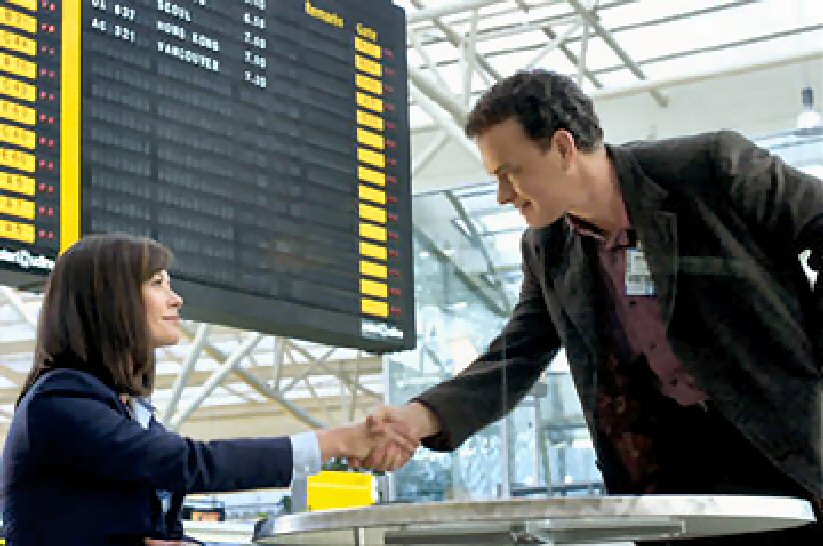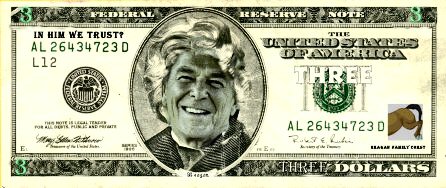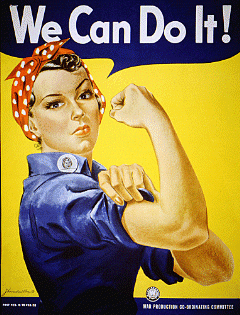June 18, 2004
The Terminal – A Movie Review
An Original Tale The Whole Family Will Love
By Fred H. Arm

It is not very often that a motion picture comes along that entertains you with such a warm fuzzy style that is also very original, funny, and tragic at the same time. The Terminal provides romance, comedy, and frustration in a wonderfully romantic and idealistic style that is so typical of Spielberg’s films. In addition, the cast is quite talented, racially diverse, endearing, thus bringing you a couple of hours the whole family can enjoy!
The “Terminal” is a tale of Viktor Navorski (Tom Hanks), who has arrived in New York from a mythical Slovak country that has just begun a bloody revolution while he is in the air en route to America. Because of the questionable status of his homeland, the State Department does not yet recognize Viktor’s passport and he is thus ordered by the Terminal Chief for the Homeland Security not to leave the International Transit Lounge at JFK until his status can be validly ascertained.
As the weeks pass, Viktor must find a place to eat, sleep, and pass his time in the strange universe of an airport terminal. His adventures lead him through a richly complex labyrinth that is absurd, generous, amusing, serendipitous and even provides him romance with a beautiful flight attendant named Amelia (Catherine Zeta-Jones). All the while, the airport official, Frank Dixon (Stanley Tucci), who has now become his protagonist, continues to make life difficult for Viktor in a series of situations that Viktor overcomes much to the chagrin of Frank.

Hanks is truly amazing as a person who can barely speak English, yet manages to get through the many hurdles facing his survival at the airport. This original tale smacks of some of Spielberg’s former flicks, yet moves along at a distinctly more mature level. One has to forgive some of the inaccuracies and improbabilities suggested here and just have fun watching the movie. This is not Academy Award stuff, but it is great entertainment and lets you feel good all the way through to the end.
June 15, 2004
Nói albinói- A Movie Review
An Icy Digression Into The Frozen North
By Fred H. Arm

Take an alienated, bald, Albino teenager named Nói (Tómas Lemarquis) in the frozen fjord of northern Iceland and blend together an estranged ineffectual father while a grandmother who does not say much is raising him and the story is destined to be tragic and dark. Although Nói is well intentioned, he lacks motivation and is prone to having spells of exceptional bad luck. He is disruptive at school if he bothers to show up at all. Ultimately he is expelled and his alcoholic dad finds Nói a job working for a priest in a graveyard. As the scenario unfolds, he woos another somber and beautiful teen named Iris (Elin Hansdóttir), who works as a gas station attendant and café clerk. His relationship to Iris appears to be the only thing going well in Nói 's life; still it is just a fragile illusion.
It is winter in Iceland, such that the fjord is cut off from the outside world, while surrounded by an ominous mountain, and buried under a shroud of snow. Beautiful shots of glaciers and chilly seasides allow the tedium of this desolation to be a lot more tolerable. If you have ever been in a dead town out in the boonies somewhere, this one is even more comatose by comparison. It is hardly surprising that everyone is so somber and alienated from one another during the dark three-hour days of winter.
Please remember that this is not simply another typical bored teenager film--underneath it all Nói seems to have real promise, although his motivation is virtually non-existent. The walls of snow and ice surrounding his village give the illusion of a natural prison. Nói’s desperate plans to break out fail miserably during a ludicrous failed bank robbery and an aborted car theft, further adding to his despair.
The movie directed by Dagur Kári is largely bleak and sometimes slow moving, yet it is temperamental, seductive, and distinctive. There are no cheap thrills, sexy scenes, car crashes, or violence, however the cinematography and the unfolding human drama draw you in like bees to honey and hold you there to it’s amazing finish. It is not until a natural disaster so totally shatter Nói’s universe that the film begins to offer the hope of a new beginning for Nói.
Nói is completely believable for anyone who ever recalls being a teenager. He is the embodiment of a disturbing reflection of the aspirations, naivety and unmanageable emotions many teens feel at that age. This film kept me enthralled and touched in equal measures right down to its startling climax. This movie is a must see for anyone who appreciates that life is different when you are just 17.
June 13, 2004
Reagan Tributes-Enough Already!
The Media Has Gone Overboard With Reagan Tributes
By Fred H. Arm

Since Reagan has died the media has gone absolutely beserk with accolades and tributes to a man simply because he was once the President of the United States. I cannot go on ignoring what I know as fact and continue bear this nauseating hero worship of a man in a job way over his head. Very few of these “cheerleading entourages” were either born yet or old enough to remember Reagan during his tenure as governor of California beginning in 1966. In 1980, when he was elected president, most writers were still in grammar school or possibly high school. The older writers must have been either out to lunch during Reagan’s tenure or wholly deluded by his charisma. A little truth now would be most refreshing. I will attempt a brief overview as follows:
Back in 1962, General Electric fired Reagan as a political liability when he took on the Tennessee Valley Authority, as an example of "big government." G.E. had contracts worth millions of dollars. About this time, Reagan switched his political affiliation to the Republican Party.
In 1966, Reagan announced his candidacy for governor of California. He promised to reduce the waste in government and to "clean up the mess at Berkeley." On November 8th, Reagan was elected by almost 1 million votes more than incumbent Democratic governor Edmund G. ("Pat") Brown.
Reagan proposed a 10% across-the-board cut. There were both needed cuts and unnecessary, unpopular ones, such as cuts in the mental health system and for the University of California. When I first came to California in 1968, I was appalled by the massive closures of mental health facilities in the state. Mentally ill people were forced to fend for themselves in the streets, perhaps leading to the massive homeless problems we face today.
On February 2, 1967, students staged an orderly demonstration in front of the California State Capitol protesting budget cuts and the governor’s request that a tuition be imposed for the first time in the University’s history. Two days later, a much louder demonstration took place with groups carrying signs reading "Tax The Rich”. On June 15th, Reagan signed a bill liberalizing California’s abortion law. He later regretted that decision. On October 25th, Reagan called for a harder line on war protestors.
In January 1969, Richard Nixon was inaugurated for his first term as president. In the spring, Reagan sent in the National Guard to break up a student strike at the University of California at Berkeley. Armed with bayonets and tear gas, the National Guard occupied Berkeley for 17 days. The event established Reagan as a peace-restoring hero for some, a trigger-happy extremist for others. In spite of campaign promises, California's state budget increased during Reagan's first term as governor.
On January 18th 1973, Reagan submitted a $9.258 billion budget with a $1.1 billion surplus, and gave taxpayers a rebate. On May 1st, Reagan defended President Richard Nixon in the midst of the Watergate scandal. Then finally, in August of 1974, this longtime Nixon defender admitted that Nixon deceived the country. On August 9th under the threat of impeachment, Nixon resigned and Ford became president. On November 5, 1974, Jerry Brown was elected governor of California.
On November 4, 1980, Reagan trounced Carter, winning 44 states in the general election, and the Republicans gained control of the Senate for the first time since 1964. On February 18, 1981, Reagan unveiled his "program for economic recovery" to a Joint Session of Congress. Reagan called for $41.4 billion in cuts from the Carter budget, mostly from "Great Society" programs to benefit the poor, and vowed to maintain a ‘safety net’ for the poor, the disabled, and the elderly. He also called for a 30% tax cut over three years and an increase in defense expenditures, and vowed not to cut Social Security.
On April 28th, Reagan appeared before Congress for the first time since his assassination attempt, receiving a hero's welcome and overwhelming support for his economic package. Despite optimism and support for Reagan's tax cuts and increased defense spending, the country plunged into a deep recession, as the Federal Reserve Board raised interest rates to fight inflation. Soon, the United States would face the largest budget deficits in its history.
On October 18th, 1981, Reagan admitted to reporters that the nation was in "a slight recession," but predicted recovery by the spring. Several days later Reagan said a balanced budget in 1984 is "not probable." On November 6th, unemployment reached a six-year high. Reagan redefined a balanced budget as "a goal."
On November 12th 1981, Reagan adopted "zero option" in Europe. The U.S. had set a date for deployment of Pershing II missiles, while promising to cancel it if the Soviets dismantle all intermediate weapons targeted at Western Europe. Meanwhile, Reagan’s daughter Patti Davis came to the forefront of the nuclear freeze movement in the Hollywood Bowl on Survival Sunday. Her opposition to her father's policies was considered personal as well as political.
August 25, 1982, the U.S. Marines arrived in Lebanon. In the fall, the nation sank into its worst recession since the Great Depression. Reagan feared budget deficits would go as high as $200 billion. On November 1st, more than 9 million Americans were officially unemployed. On January 1, 1983, the official unemployment rate reached 11.5 million. Hardest hit was the "rustbelt." In Milwaukee, 20,000 waited in 20-degree weather to apply for 200 jobs at an auto-frame factory. In January 1983, Reagan's approval rating plummeted to 35%. On January 31st, Reagan submitted his fiscal 1984 budget to Congress with an $189billion deficit. A combination of the recession, tax cuts, and an increase in defense spending were ostensibly to blame. Advisors urged Reagan to either raise taxes or cut defense, Reagan rejected the advice and vows to "stay the course."
On October 25, 1983, in order to protect against a perceived a Communist threat in Grenada, and to protect U.S. medical students from growing unrest, 5,000 U.S. troops invaded the island nation.
On August 27, 1986, Reagan signed an anti-terrorism law that banned arms sales to nations that support terrorism, and strengthened U.S. anti-terrorist measures. Then surprisingly, in September, former National Security Advisor WilliamMcFarlane took 23 tons of weapons to Iran. On October 30th, 500 anti-tank missiles were shipped to Iran. On November 3rd, Lebanese magazine "Al Shiraa" reported that the U.S. had sold arms to Iran. The Iranian government confirmed the story. This marked the beginning of the Iran-Contra scandal.
November 13th 1986, in a nationally televised speech to defend against charges concerning arms sales to Iran, Reagan admitted sending some defensive weapons and spare parts to Iran, but denied it was part of an arms for hostages deal. "Our government has a firm policy not to capitulate to terrorist demands. We did not -- repeat, did not -- trade weapons or anything else for hostages, nor will we." Polls show that the American people did not believe Reagan.
November 24th, Meese told Reagan that some proceeds from the sale of arms to Iran went to the Contras. Reagan was visibly shaken and according to Meese, surprised. He was aware that the diversion of funds could mean impeachment for violation of the Boland Amendment.
On November 25th, National Security Advisor John Poindexter resigned and Oliver North was fired. In a press conference, Meese announced Iran-Contra: that $10 million to $30 million of profits from the sale of U.S. arms to Iran had been diverted to Swiss bank accounts for use by Contra rebels in Nicaragua.
On February 26, 1987, the Tower Commission report was delivered to Reagan. The report could not link Reagan to diversion of funds from Iran to the Contras, however concluded that Reagan, confused and unaware, allowed himself to be misled by dishonest staff members who organized the trade of arms to Iran for hostages held in Lebanon and pursued a secret war against the Nicaraguan government. The report charges that Reagan had failed to "insist upon accountability and performance review, " allowing the National Security Council process to collapse. Reagan’s approval rating dropped down to 42%.
October 19, 1987: The stock market dropped 500 points. The drop was partially blamed on rising deficits.
On March 16, 1988, Oliver North, John Poindexter, and two others were indicted by a federal grand jury on charges of conspiring to defraud the U.S. government by secretly providing funds and supplies to the Contra rebels fighting the government of Nicaragua.

Of course, there are many other fiascos of this not-such-a-wunderkind president such as the idiotic Star Wars failure, diminished social security benefits, exacerbated military spending when promises were made to cut government expenditures, sponsorship of repressive foreign governments that are too extensive to enumerate here.
I am sure Reagan was probably a nice fellow, however, that is not enough to run a country or to canonize him. It is a sad commentary on the American people that they so quickly forget the letdowns they suffered by incompetent leaders and so they glorify their memory with distorted facts and wondrous accolades, perhaps so that they can feel better about their great leaders. That old cliché, “that the evil in man lives on while the good is interred in their bones” does not apply when it comes to dead presidents. Instead, the converse seems to be true. I must add though that as bad as I thought Reagan was, I would still rather have him than Bush.
June 05, 2004
Rosie The Riveter-The Beginning or the End of Family?
By Fred H. Arm

Recently, Rep. George Miller (D-Martinez) announced that legislation honoring the 6 million women who made history by creating the Rosie the Riveter/World War II Home Front National Historical Park in Richmond. The bill passed in the House honoring the important home contributions made by American women to the Allied victory in World War II. The women learned skilled jobs previously reserved for men, earned 'men's' wages, and gained a new independence. Whether this is a good thing or bad thing, history will ultimately reveal.
Before this historic event, women were almost exclusively in the home. Prior to the marriage, women could only work as secretaries, nurses, maids, cooks, etc. The professions were almost totally devoid of women. Women were getting ready to become housewives and mothers, not to strive for careers in the work world. Work as we knew it was the responsibility of men and caring for the home was the province of women. Life was simple. These were the rules and had been so for thousands of years.
Children were almost exclusively cared for by their mothers. When a child came home from school, he/she knew that Mom would be there, providing cookies and milk, enforcing their rambunctiousness, and dispatching them to their household chores. When Dad came home there usually was a hot meal waiting him, which he ate with the rest of the family. These roles were clearly defined and few people ever questioned them.
Along came World War II and the new 'Rosies' built tanks and ships, working as welders, machinists, mechanics, pipe fitters, electricians, and boilermakers. Their men were off to war in Europe and Asia and could not really complain that much. Dramatically, this shift gave permission to millions of housewives to explore other options rather than be elbow deep in dirty diapers and dishes. Women slowly ventured into the sacrosanct professions of law, medicine, politics, and business.
Soon the trickle became a flood and a full bloom feminist revolution was launched. In the sixties, the momentum carried to the rebellious youth culture spawning the sexual and drug revolution. Everything was turned upside down. Roles were reversed, women burned their bras, people chanted the mantras of “tune out and turn on”. Inflation soon raised its ugly head and people quickly realized that if they wanted their own homes to achieve the good life, it was essential that husband and wife both needed to work
Now the children either have no one at home when they return from school, go to day care, or a baby-sitter oversees their activities. A new kind of alienation has crept into the home. Everyone eats at different times, people do not know their own neighbors, and mobility has allowed couples to live far away from their nuclear families. Crime has reached epidemic proportions. Morality has reached an all-time low. Affluence and lack of supervision has contributed to children becoming obese and lazy. Work ethics and attitudes have left us far behind the rest of the world.
Who can we blame? Or should we blame anybody? It seems quite hopeless overall. Perhaps honoring ‘Rosie’ is really not such a great idea. Who can say? The future will play itself out depending on economic, social, and political forces yet to be realized. Humankind has historically corrected these anomalies over time, yet I wonder if it will this time around.
Or is life not so bad after all? Is this door we have passed through a “Lady or a Tiger”. 
June 02, 2004
Harry Potter – The Prisoner of Azkaban – Movie Review
A Garbled Tale – A Lot of Fluff
By Fred H. Arm

So here we are with number three in the series of a now older 13 year-old Harry Potter that badly limps in story content. Sure, the movie is full of neat special effects, cute scenarios, and spectacular sets; however, as far as a good tale is concerned, this screenwriter must have been absent during writing 101. This fable keeps bouncing around from one implausible and twisted situation to another without rhyme nor reason to fortify its transitions. If I wasn’t enthralled by the effects presented on the giant IMAX screen at the Loew’s IMAX, I probably would have spent considerably more time at the snack bar and the restroom.
Many of the special effects seem to be a rip-off of the Lord of the Ring’s last adventure. Especially the Werewolf whose face, color and body is virtually identical to the incoherent, naked dwarf in LOTR who if you remember treks along with the heroes throughout the other movie. The “Hippogriff”, half bird and half horse, also seems similar to some creatures featured in LOTR. Frankly, I was not too impressed with the rest of the CGI monsters made for the film. The dreaded “Dementors”, who ostensibly suck the soul out their victims, never seemed to be able to accomplish that task. They seem far better suited for an animated film than a feature.
There were some funny moments, especially at the beginning when Harry casts a spell on his shrew of an Aunt by causing her to inflate grotesquely and float off into the sky over London. His antagonists were lamely presented without nearly the intensity of the prior Potters. In this muddled presentation it was difficult to establish who in fact the actual heavies were. The movie jerks you back and forth until you don’t know whom to hiss at any more, nor do you care.
Had this film been better crafted, it would have been quite memorable in the IMAX format. Now the format and the scenery are the star, leaving the film a mediocre children’s tale. I query whether even a child would be entertained by the confusion and ambiguity. The stunning scenery and special sets are a delight to see; nevertheless, I would still pass on this puppy, unless of course you get to see it on the IMAX screen.
Opens June 4th, 2004.